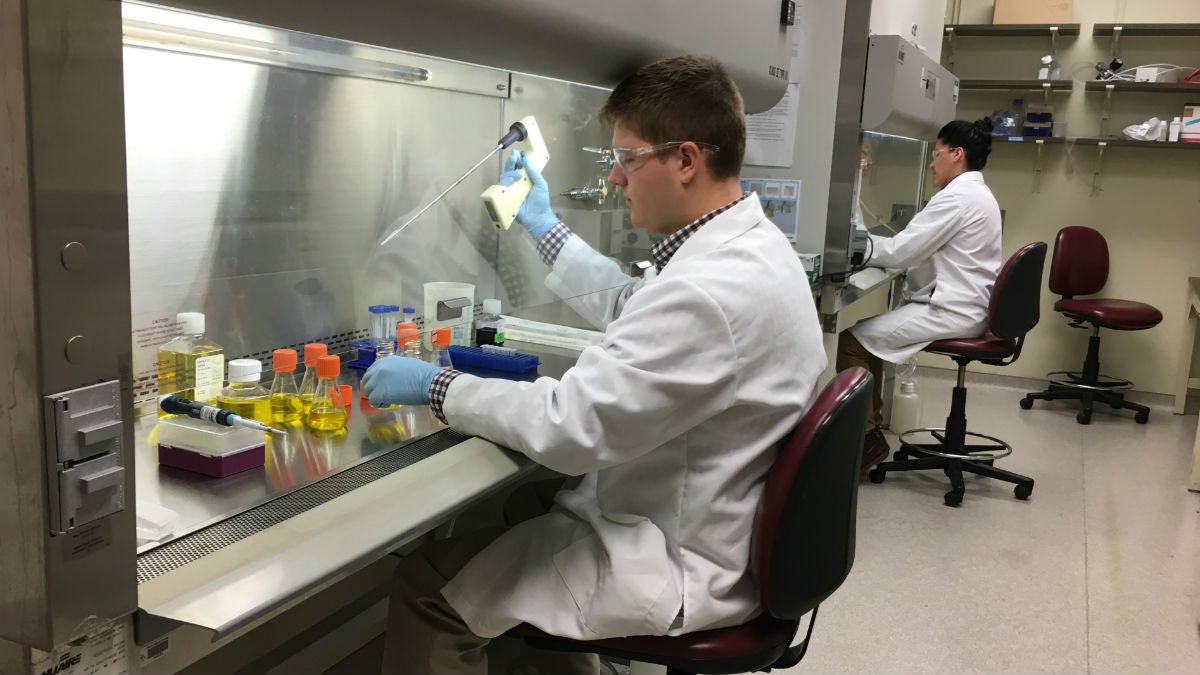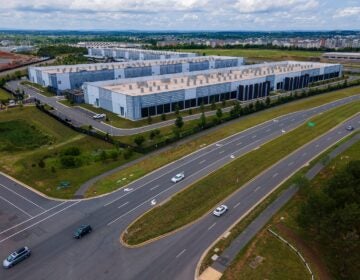University of Delaware builds on a bio-job future with increased emphasis on research [video]

Ph.D. students at the University of Delaware work in a lab at the Delaware Biotechnology Institute in Newark. (Mark Eichmann/WHYY)
Delaware is already a Research 1 university, the highest classification of research schools, but new President Dennis Assanis is leading an increase in that research effort.
There’s been a lot of talk about bringing back or creating new manufacturing jobs. In December, the University of Delaware was named as the 11th site in the nationwide Manufacturing USA Institute. It’s the latest example of a growing emphasis on research at UD.
UD is now the headquarters for the National Institute for Innovation in Manufacturing Biopharmaceuticals or NIIMBL, where researchers are working on improving techniques for manufacturing bio-pharmaceuticals. “One could argue that all the easy manufacturing challenges have been solved,” said NIIMBL director Kelvin Lee. “What’s left to really go to the next level are some of the more challenging manufacturing issues that a number of companies want to try to address and solve.”
Solving those problems could lead to treatments for Alzheimer’s disease and some cardiovascular disease. Finding those solutions is part of the University of Delaware’s increasing focus on research.
“It requires a commitment by the institution to try to invest in the right way, to grow in the right way and we have some very inspired and new leadership at the university that is really trying to push the boundaries to promote not only the university’s interest in terms of research and expanding in that direction, but also our impact in the nation,” Lee said.
As part of the research push, Charlie Riordan’s vice provost position was promoted to a vice president post, reporting directly to UD’s new president Dennis Assanis.
“I think that reflects a natural evolution of the institution and the increasing importance that the president, the board of trustees and the entire university places on the role of research, but also scholarship and innovation,” Riordan said. “Increasingly more and more students across all disciplines are expected to have a research experience, particularly at the undergraduate level.”
That research experience can also better prepare students for more than just their first job out of college. “If all we do is prepare them for their first job out of college, we haven’t been successful,” Riordan said. “So we’re really focused on that longer term journey and part of that longer term journey is to ensure that those students are prepared in ways that they can help drive the economy by creating new industries and creating new companies.”
One of those new companies created out of UD research is SimUCare, founded by Professor Amy Cowperwaith. The company’s SimUWare products allow nursing students to learn how to interact with patients who have had a tracheostomy. The mock patients wear a device called SimUTrach on their chest. Replacing the old training manikins, this device uses sensors that send signals to the trained “patient” who responds to the procedure as necessary. It’s designed to help teach nurses and other medical professionals how to handle all the different ways a patient might respond during treatment.
“Now they get to see real time reactions, real time behaviors and they get feedback at the end of the simulation,” Cowperwaith said.
After collaborating with other UD departments including theater and mechanical design, SimUCare was launched as a company in 2015.
“The amount of support that you need to do research and development on a product, financially would not be feasible or possible for any of the faculty members here,” Cowperwaith said. “Not just financial support, but the support to encourage faculty to do these research projects.”
Whether it’s developing new bio-pharmaceuticals or better training method for nurses, UD’s new research push is well on its way.
There are more than 1,000 students taking part in undergraduate research each year and over 3,800 graduate students are involved in research projects in all sorts of disciplines.
There’s also a workforce development piece in all this. With thousands of students learning very marketable skills in emerging employment sectors, that could draw new employers in those fields to move or start up here in Delaware.
“Over the past several years, we’ve expended more than $140 million in research sponsored dollars that come from, primarily from the federal government, certainly also from the private sector, and from state,” Riordan said. “We fully expect and know that by virtue of landing this Manufacturing USA award, out of the Department of Commerce, that that trajectory is headed upward.”
WHYY is your source for fact-based, in-depth journalism and information. As a nonprofit organization, we rely on financial support from readers like you. Please give today.





